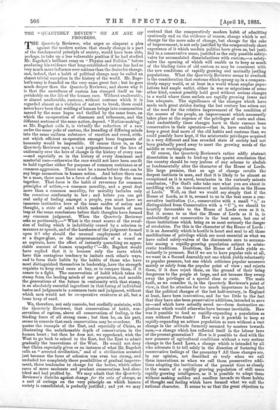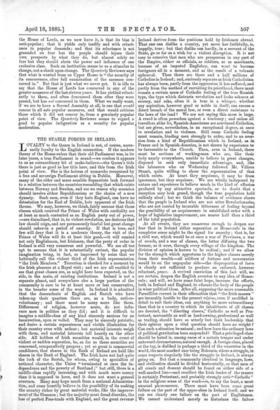THE " QUARTERLY REVIEW " ON AN AGE OF PROGRESS.
rE Quarterly Reviewer, who urges so eloquent a plea against the modern notion that steady change is a part of the fundamental principle of society, would have been able, perhaps, to take up a less vulnerable position if he had studied Mr. Bagehot's brilliant essay on " Physics and Politics " before producing his evidence that long-established custom has had so very much more influence over nations than the desire for change, and, indeed, that a habit of political change may be called an almost trivial exception in the history of the world. Mr. Bagehot's essay is founded on the very same great fact • but he goes much deeper than the Quarterly Reviewer, and shows why it is that the sacredness of custom has stamped itself so imperishably on the life of the human race. Without unalterable, or almost unalterable, customs, without customs which it is regarded almost as a violation of nature to break, there could never have been that welding of human beings into communities moved by the same hopes and thrilled by the same fears, on which the co-operation of clansmen and tribesmen, and the different sections of the same nation, depend. "Nation-making," as Mr. Bagehot calls it, is virtually the reduction of a race under the same yoke of custom, the kneading of differing minds into the same uniform substance of emotion and creed, without which efficient co-operation amongst loose fragments of humanity would be impossible. Of course there is, as the Quarterly Reviewer says, a vast preponderance of the love of uniformity over the love of change in the history of every race —and especially so in the history of every dominant and masterful race—otherwise the race would not have been one fit to hold together either for purposes of common resistance or of common aggression. There must be a mass before there can be any'large momentum in human action. And before there can be a mass, there must be a force of cohesion to keep the mass together. That force is the habit of reverence for common principles of action,—a common morality, and a great deal more than a common morality, for morality includes only the conscious conformity to law ; and before you can get real unity of feeling ansongst a people, you must have an immense instinctive love of the same modes of action and thought, a state of mind which makes the hearts of men leap at the same conclusions before their thoughts have formed any common judgment. When the Quarterly Reviewer asks so pertinently,—" What is the exact source of the revulsion' of feeling which is indubitably caused by a solecism in manners or speech, and of the harshness of the judgment formed upon it I why should the unusual employment of a fork or a finger-glass, or the mispronunciation of a vowel or an aspirate, have the effect of instantly quenching an appreciable amount of human sympathy ?"—Mr. Bagehot would have replied that it is because only the races which have this contagious tendency to imitate each other's ways, and to form their habits by the habits of those who have most distinguished themselves in leadership, have the strength requisite to keep rival races at bay, or to conquer them, if it comes to a fight. The conservatism of habit which takes its stamp from the leading minds of one generation, and moulds the generations of the future in conformity with that stamp, is an absolutely essential ingredient in that fusing of individual tastes and judgments in a common taste and judgment, without which men would not be co-operative creatures at all, but a loose heap of sand.
We, therefore, not only concede, but cordially maintain, with the Quarterly Reviewer, that conservatism of habit, conservatism of custom, above all conservatism of feeling, is the binding force of all strong races ; but then he, on his part, seems to concede that such conservatism may be overdone. He quotes the example of the East, and especially of China, as illustrating the unfathomable depth of conservatism in the human heart ' • but then he does not, we apprehend, wish the West to go back to school to the East, but the East to admit gradually the innovations of the West. He would not deny that China especially gives us an instance of what Mr. Bagehot calls an " arrested civilisation," and of a civilisation arrested just because the force of cohesion was even too strong, and excluded too completely those possibilities of gradual improvement, those tendencies to change for the better, which other races of more moderate and prudent conservatism had cherished and had profited by. We may admit that the Quarterly Reviewer's diatribe against change for the sake of change, as a sort of outrage on the very principle on which human society is consolidated, is perfectly justified ; and yet we may contend that the comparatively modern habit of admitting cautiously and on the evidence of reason, change which is not change for the mere sake of change, but change for the sake of improvement, is not only justified by the comparatively short experience of it which modern politics have given us, but justified in a conservative sense, justified as the only possible safetyvalve for accumulated dissatisfactions with custom,—a safetyvalve the opening of which will enable us to keep as much of the binding force of old custom as may be consistent with the new conditions of rapidly growing and mutually jostling populations. What the Quarterly Reviewer seems to overlook is the consideration that customs which sprang up in a comparatively empty world, or at least in a world whose surplus populations had ample outlet, either in war or migrations of some other kind, cannot possibly hold good without serious changes in a world where these outlets are rapidly growing fewer and less adequate. The significance of the changes which have made such great strides during the last century has arisen out of the need for the relative improvement of the condition of the. masses of the people, an improvement which necessarily takes place at the expense of the privileges of caste and class. And undoubtedly these changes have in their essence been conservative in their operation—that is, have enabled us to keep a great deal more of the old habits and customs than we could possibly have kept, if the aristocratic privileges acquired in a very different and 'less crowded state of society had not been gradually pared away to meet the growing needs of the middle or working-classes.
Of course, the Quarterly Reviewer's rather oddly abstract dissertation is made to lead-up to the quaint conclusion that the country should be very jealous of any scheme to abolish or fundamentally alter the character of the House of Lords. His large premiss, that an age of change revolts the deepest instincts in man, and that it is likely to be almost as exceptional as it is novel, terminates in the curiously minute conclusion, ' For God's sake take care what you are about in meddling with _so time-honoured an institution as the House of Lords.' Well, on that we would say simply that if the House of Lords, as it is, seemed to us in the best sense a conservative institution (i.e., conservative with a small "c," as distinguished from Conservative with a " C "), we should be heartily favourable to the House of Lords even as it is. But it seems to us that the House of Lords as it is, is undoubtedly not conservative in the best sense, but one of those institutions which bring on us most seriously the danger of revolution. For this is the character of the House of Lords : it is an Assembly, which is hostile in heart and soul to all those modifications of privilege which are most essential as what we have called safety-valves of the discontents sure to accumulate among a rapidly-growing population subject to aristocratic traditions. Doubtless, the House of Lords yields reluctantly to pressure. But if we are to have popular rule at all, we want in a Second Assembly not one which yields reluctantly to popular pressure, but one which criticises popular measures mainly or solely from the popular point of view ; and rejects them, if it does reject them, on the ground of their being dangerous to the people at large, and not because they sweep away the privileges of a special class or caste. The main fault, as we consider it, in the Quarterly Reviewer's point of view, is that he attaches far too much importance to the fact that the political changes of the last half-century, in England at least, have been innovations, and 'far too little to the fact that they have also been preservative additions, intended to save us—and which have actually saved us—from destructive explosions which would otherwise have become inevitable. How was it possible to feed so rapidly-expanding a population as ours without Free-trade ? How was it possible to keep so rapidly-expanding an artisan population as ours without a vast change in the attitude formerly assumed by masters towards men,—a change which has reflected itself in the labour laws of the present generation? How is it possible to deal with the new pressure of agricultural conditions without a very serious change in the Land Laws, a change which is intended by all who advocate it to tell solely in the direction of fostering the conservative feelings of the peasantry f All these changes are, in our opinion, not described so truly when we call them innovations, as when we call them preservative additions adapting the institutions of the present time as closely to the wants of a rapidly growing population of still more rapidly growing intelligence, as it is possible to adapt them without making sudden and .needless inroads on those habits of thought and feeling which have formed what we call the national character. It seems to us that the great objection to the House of Lords, as we now have it, is that its bias is anti-popular; that it yields only tardily and with reluctance to popular demands ; and that its reluctance is not grounded on fear lest the people should injure their own prospects by what they do, but almost solely on fear lest they should abate the power and influence of one exclusive class. Such an institution seems to us a stimulus to change, not a check upon change. The Quarterly Reviewer says that what is wanted from an Upper House is " the security of its concurrence, after full examination of the measure concurred in." But that is just what we never get. It is idle to say that the House of Lords has concurred in any of the greater measures of the lest sixteen years. It has yielded reluctantly to them, and often denounced them after they were passed, but has not concurred in them. What we really want, if we are to have a Second Assembly at all, is one that would concur in all safe popular measures, and that would criticise those which it did not concur in, from a genuinely popular point of view. The Quarterly Reviewer seems to regard a goad to popular indignation as a security for popular moderation.



































 Previous page
Previous page